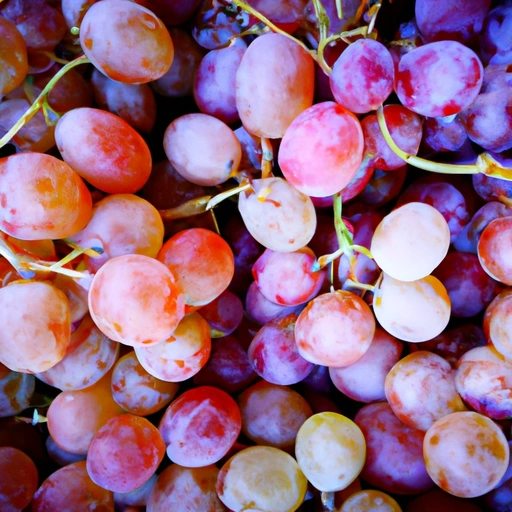Muscat
Description

Muscat is a term that refers to a family of grapes and the wines produced from them. Known for their sweet and fruity flavor profile, Muscat grapes come in various colors ranging from white to black and are used in various culinary applications. In the context of food recipes, 'Muscat' often relates to either the grapes themselves, the wine made from these grapes, or a flavoring derived from them, such as Muscat extract or essence.
Common uses
Muscat grapes and their derivatives are commonly used in a variety of food recipes. The grapes can be eaten fresh as a sweet snack or used in fruit salads. Muscat wine is often used in dessert recipes or as a flavoring agent for baked goods. The essence of Muscat, extracted from the grapes or wine, is also used to infuse a fragrant sweetness into pastries, confections, and even savory dishes.
Nutritional value
Calories
100 grams of Muscat grapes contain approximately 70 calories.
Protein
Muscat grapes offer about 0.63 grams of protein per 100 grams.
Fat
These grapes are low in fat, with only 0.16 grams per 100 grams.
Carbohydrates
Carbohydrates in Muscat grapes are about 17.2 grams per 100 grams, mostly from natural sugars.
Vitamins
Muscat grapes are a source of Vitamin C, providing about 3.2 mg per 100 grams, as well as Vitamin K, and some B vitamins.
Minerals
The grapes contain minerals like potassium, with around 191 mg per 100 grams, as well as calcium, magnesium, and phosphorus.
Health benefits
Muscat grapes are rich in antioxidants, particularly polyphenols, which may help reduce the risk of chronic diseases. The fiber content in the grapes can aid in digestion and promote a feeling of fullness. The vitamins and minerals found in Muscat grapes contribute to overall health, supporting the immune system and bone health.
Potential risks
As with any food, moderation is key. The high sugar content in Muscat grapes may not be suitable for individuals managing blood sugar levels. Furthermore, overconsumption could lead to weight gain. It's also important to note that Muscat wine and any alcoholic derivatives should be consumed responsibly.
Common recipes
Muscat grapes are often used in fruit tarts, salads, and compotes. Muscat wine is a popular choice for poaching fruits and making syrupy reductions for desserts. The extract can be added to flavor cakes, cookies, and creams.
Cooking methods
Fresh Muscat grapes are typically eaten raw, while the wine can be reduced through simmering to intensify its flavor in dishes. The extract is added as a flavoring at different stages of cooking, depending on the recipe.
Pairing with other ingredients
Muscat pairs well with a variety of foods, including rich cheeses, roasted nuts, and spicy dishes. The sweetness of the grapes or wine balances the heat and complements the creaminess of certain cheeses.
Summary
Muscat is a versatile ingredient known for its sweet and aromatic profile, suitable for enhancing both sweet and savory dishes. With a rich history and a host of health benefits, this grape variety occupies a special place in culinary traditions around the globe. Whether used fresh, as a wine, or as an extract, Muscat adds a delightful dimension to a multitude of recipes.